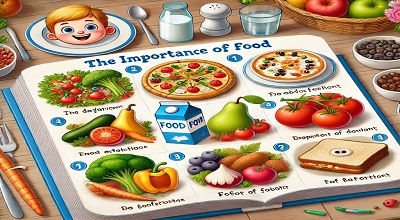Lesson Plan on the Importance of Food
Today in here the latest A Lesson Plan on the ImporLesson Plan on the Importance of Food. You can download the latest lesson plan on the importance of food in pdf format.
Title: Lesson Plan on the Importance of Food
Grade Level: Middle School
Objective:
- Students will understand the essential role of food in maintaining health and well-being.
- Students will learn about the different food groups and their functions in the body.
- Students will explore the cultural and social aspects of food.
Materials:
- Whiteboard and markers
- Projector or whiteboard for multimedia presentation
- Handouts on the food pyramid or plate
- Pictures or samples of various foods
- Chart paper and markers
- Internet access for research (optional)
Lesson Outline:
Introduction (15 minutes):
- Begin with a discussion about the importance of breakfast and how it sets the tone for the day.
- Ask students to share their favorite foods and discuss why they enjoy them.
- Introduce the main question: “Why is food important?”
Body (60 minutes):
Part 1: Nutrients and Food Groups (30 minutes):
- Explain the concept of nutrients and the role they play in the body.
- Discuss the five main food groups: fruits, vegetables, grains, protein, and dairy.
- Show pictures or samples of foods from each group, discussing their nutritional benefits.
- Hand out the food pyramid or plate diagrams, and ask students to label different foods in each category.
2: Part: The Digestive System (15 minutes):
- Briefly explain the digestive system and how it processes food.
- Use visuals or diagrams to illustrate the journey of food through the digestive system.
- Discuss the importance of proper digestion for nutrient absorption.
Part 3: Cultural and Social Aspects of Food (15 minutes):
- Discuss how food is often tied to cultural identity and traditions.
- Explore how social gatherings often revolve around food.
- Encourage students to share their own experiences with culturally significant foods.
Activity (30 minutes):
- Divide students into small groups and assign each group a specific food group.
- Ask each group to create a poster illustrating the importance of their assigned food group.
- Groups should include examples of foods, nutrients, and the benefits of consuming items from their assigned group.
- Groups present their posters to the class.
Conclusion (15 minutes):
- Review key points about the importance of food.
- Discuss how making healthy food choices contributes to overall well-being.
- Encourage students to share what they’ve learned and any changes they might make in their eating habits.
Homework/Extension (optional):
- Assign a research project where students investigate traditional foods from different cultures and present their findings to the class.
Assessment:
Evaluate student understanding through class participation, group poster presentations, and a brief written reflection on the importance of food in maintaining health.
